The Career Blog
Thank you for reading & supporting my blog. Please share with friends, family & colleagues!
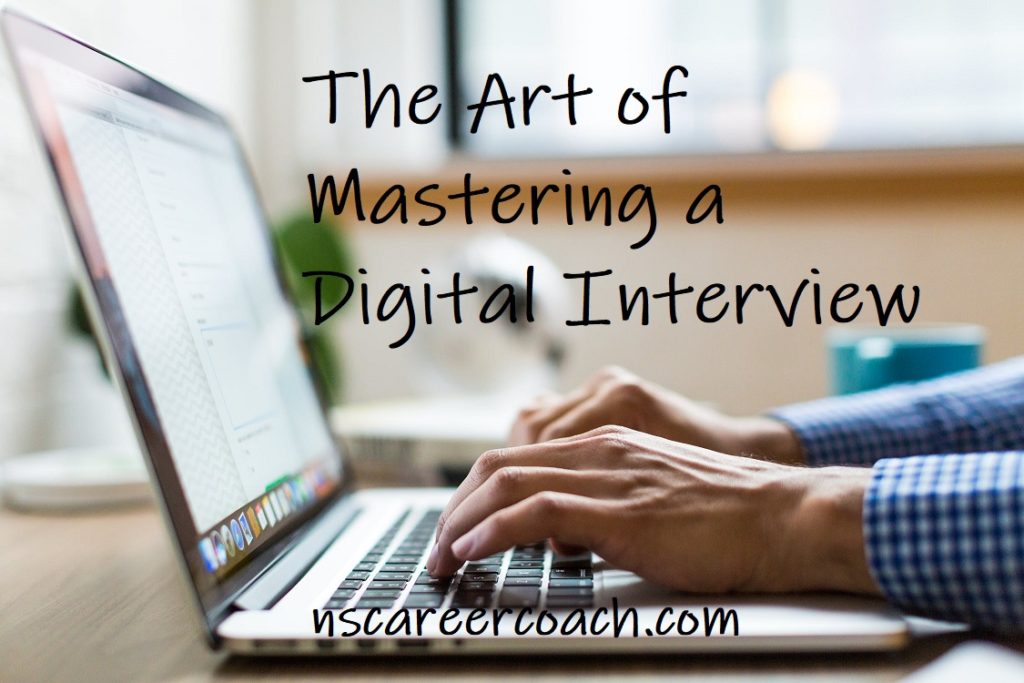
The hiring practice of digital interviewing has become increasingly popular and, there’s no question, it’s here to stay. The process saves time, adds perspective beyond the traditional phone interview, creates flexibility around scheduling and location, and increases the size of the candidate pool taken under consideration. I have outlined some important things to consider in advance of your video interview.
Know what to expect
The employer is likely to share important information with you up front. This is likely to include factors such as the digital interview platform that will be utilized; hirevue is a popular one – you can visit their website to view a demonstration (https://www.hirevue.com/). The employer will give you a date to complete the interview by and, if you’re lucky, they will share with you the number of interview questions to expect. They are less likely to share the content of those questions with you, however. You will typically be given a certain amount of time to read each question and to respond.
Most digital interview platforms will give you an opportunity to play around with the functions and practice what it is like to record yourself with their tool. In some cases you will be given the ability to view and re-record your responses – but that’s not always the case so try to do your best and if you mess up just keep going. Remember, no one is perfect! The interviewer is looking to get to know you, not to test your ability to record a perfect video of yourself.
Logistics & preparation
Dress professionally – the same you would for any in-person interview. Because you’ll be on video, I recommend wearing solid colors and nothing too bright to avoid distraction. Choose your device (tablet, laptop or phone) with a front-facing camera, whichever you feel most comfortable with. Check your internet connection prior to beginning your interview to ensure there will be no issues. Make sure your device is fully charged or plugged in.
Schedule yourself to complete the interview during a time that you will not feel rushed or become interrupted. Choose the appropriate place to record yourself – ideally a quiet space with a neutral background and the right amount of lighting. Have your resume on hand should you want to make (quick) references to specific experience.
Practice in advance
This is critical to your success. Review the job description and prepare like you would for any interview (see my blog 5 Ways to Prepare for your Next Interview). Review common interview questions like “Tell us about yourself.” or “What makes you a great candidate for this role/organization?” Practice recording yourself in response to questions and time yourself in doing so. You are likely to be given between one and three minutes to respond to each question. Avoid running out of time by getting used to what that feels like, keeping your answers brief and succinct. The more you repeat this process, the less awkward it will feel when it comes time for the real thing.
Be authentic
There’s no question, it is not easy to appear comfortable or very authentic in recording a video of yourself. Focus on utilizing non-verbal cues like smiling and eye contact; avoid distracting behaviors like fidgeting with things in your vicinity. If you find yourself going off track, don’t be afraid to reset and get back to the question asked of you. Keep in mind that while the digital interview can feel intimidating, it provides you with a great opportunity to demonstrate your personality and strengths beyond the text of your resume.

Applicant tracking system (ATS) software is a hiring and recruitment tool that is frequently utilized by organizations to collect and sort through resumes. The candidate pool is narrowed down significantly by ATS criteria, preventing many qualified candidates from ever being considered. Here are 7 tips to prevent your resume from slipping through the cracks.
File Type
There are different types of ATS with different capabilities. The safest approach is to submit your resume as a Word Document (preferably .docx). Outside of submitting your resume online through and ATS, I recommend utilizing a PDF to ensure your formatting remains intact. Name the file as your first and last name, the job title you are applying for and the employer that you are applying with.
Header & Footer
Some ATS are unable to read information that is placed in a header or footer. I suggest you avoid placing any information here, especially your name and contact information. There are few exceptions to this, such as placing page numbers in your footer.
Keyword Optimization
All ATS are searching for keywords and some ATS are assigning scores based on the frequency and placement of keywords. To simplify this process for yourself, make a list of all the routine keywords that embody your skills, knowledge and experience. Incorporate these keywords into one resume that will serve as your master resume. A profile (summary) and core competencies (areas of expertise) section are ideal for keyword placement. Be sure to support keywords with concrete examples throughout your experience section.
If your resume contains acronyms spell them out, for example: Search Engine Optimization (SEO). You can’t be sure what the ATS is searching for – the words spelled out or the acronym – cover your bases by doing both. Do not attempt to cheat the ATS by placing additional keywords in white text or over utilizing (commonly referred to as stuffing) keywords. While you may beat the ATS, these tactics will make you appear inauthentic and will not impress a recruiter or hiring manager.
Customization
One size does not fit all. Continue to adapt and tailor your master resume each and every time you apply for different opportunities. Optimize the keywords in your resume and align with the language of the job posting by leveraging the qualifications/requirements in the job descriptions. Utilize word clouds to identify the most prominent keywords in the job descriptions; there are many great (and free) tools out there for this purpose; here are a couple that I recommend: https://worditout.com/word-cloud/create or https://tagcrowd.com/.
Design & Format
When it comes to ATS, less is more. Templates, fancy bullets, tables, charts and graphics all run the risk of not being parsed by the ATS. Reserve your graphic-oriented resume for direct delivery (emailing and/or handing to a recruiter/hiring manager).
Chronological vs. Functional
A chronological resume lists your work history in order of dates, starting with your most recent position. A functional resume focuses on your skills and is typically used when you are changing careers, have gaps in your employment history, or if your work history is not directly related to the job you are seeking. Both ATS and recruiters/hiring managers are accustomed to reading/parsing resumes in chronological order. I typically recommend utilizing a traditional, chronological format.
Put Your Resume to the ATS Test
You can see how ATS views your resume by simply copying and pasting all of the text in your resume into a plain text document (you can use Notepad for this purpose). This will allow you to identify and address any issues prior to submitting your resume online.
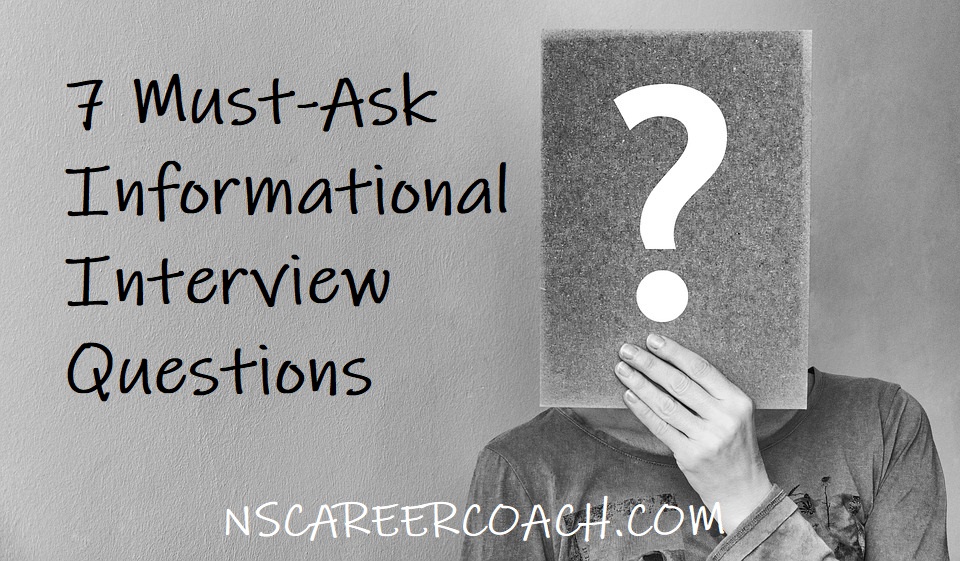
Informational interviews are ideal if you are a recent graduate, thinking about changing careers, have a recent gap in your experience and/or are seeking opportunities to expand your network. This informal meeting allows you to gather information, make a connection and receive advice from an individual in a particular career, industry or workplace that is of potential interest to you. It is critical that you prepare questions in advance and make the best of your time with this individual.
Here are the 7 must-ask questions to get you started:
- How and why did you decide to pursue this path?
- Can you tell me about what a typical day looks like in your role?
- What is the most challenging/rewarding part of what you do?
- How do you see this industry changing in the next 5-10+ years?
- What education/experience has helped you the most?
- What advice would you give to someone considering this career/industry?
- Would you please take a look at my resume and provide your feedback?
Consider these questions as conversation starters to accomplish three main goals: to learn, to connect and to seek advice. Express your gratitude and follow-up afterwards to thank this person for their time. Stay connected and send the occasional note to update this individual on your progress.
With a new and in-depth understanding of the path that you’re interested in, you can make an informed decision about whether or not to pursue this field. Still unsure? Consider talking with additional professionals – every individual will have a unique perspective to offer and you’ll continue expanding your network as a result.

The Most Memorable Interview Starts With Your Story.
Engaging
Recruiters and hiring managers are accustomed to hearing polished, stock responses to questions, such as “Tell me about yourself.” We have a natural tendency to summarize the information that is on our resumes, a repetition of what the employer already knows about you and has access to. Rather than summarizing your resume, consider what it is you want an employer to know about you that sets you apart from other candidates and prepare stories that demonstrate those traits. Keep your interviewer engaged with relevant and interesting stories.
Authentic
Your story gives insight into your personality, capabilities and passion in a way that words on paper cannot. Preparing the right stories for common interview questions will paint a clear picture of who you are as a person and a professional. Employers are looking beyond credentials more than ever; they are looking to determine that you not only have the skills to do the job, but that you will also fit the culture of the organization.
Behavioral
Almost all interviews contain behavioral-based interview questions now. Here’s a few examples:
- Give an example of a goal you reached and tell me how you achieved it.
- What do you do when your schedule is interrupted? Give an example of how you handled this.
- Tell me about how you worked effectively under pressure.
Consider these sort of common interview questions in advance and prepare 4-6 stories to tell that demonstrate a time when you reached your goals, handled interruptions and worked well under pressure.
A quick example from the most memorable interview I had as a former recruiter…
I interviewed a candidate for a nursing position. I asked her to tell me about a challenge at work and how she overcame it. She told me a story about an older individual who she cared for in the home setting as a Visiting Aide. She told me that this individual lived alone with her dog, was quite demanding and a generally tough client to work with.
After many visits to the home, the candidate told me, she discovered her patients’ dog dead in the bathroom. She proceeded to tell me that she became very concerned about the health hazards of this and how she swiftly prepared to safely remove the animal from the home. She further explained that the individual she cared for was very attached to her pet and so giving this news was difficult. To ease the burden and respectfully take care of the remains, she explained that she created a burial for the pet.
This interview took place several years ago and her story remains a vivid memory. By telling this story, I saw a number the of traits that I was looking for in an ideal candidate for the role: patience, grit, compassion and empathy. I didn’t hesitate to offer her a job, in large part due to her memorable story.
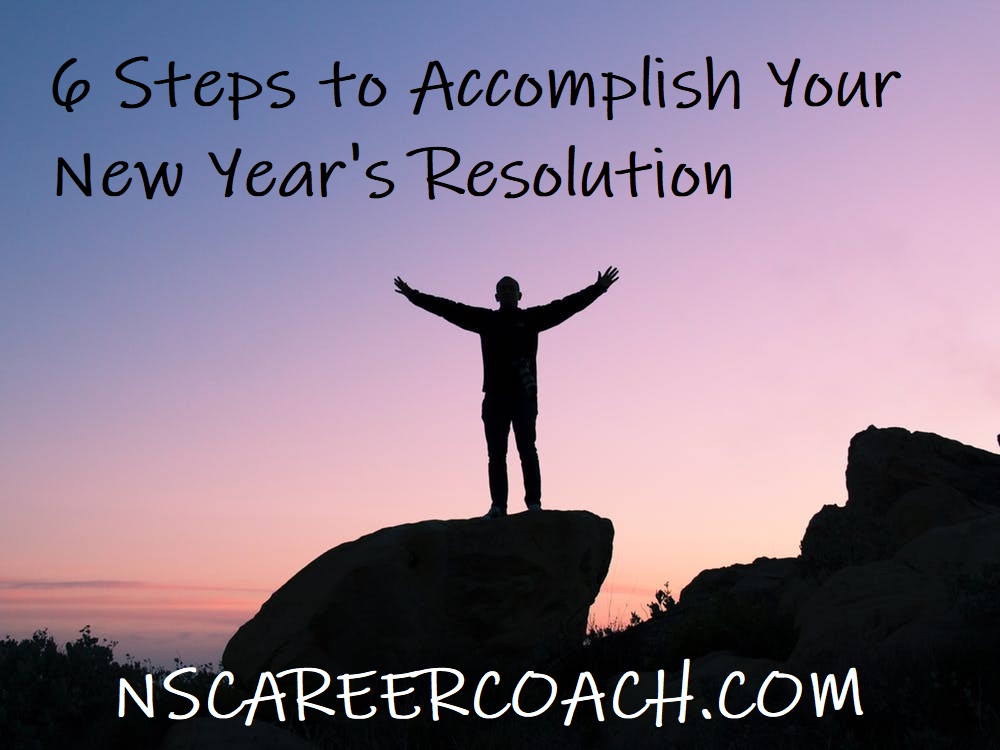
How many times have you set a New Year’s resolution that you never accomplished? This is going to be YOUR year – follow these steps and you’re on a path to succeed.
Be specific
Think in detail about what it is you are setting out to accomplish. Are you setting a weight loss goal? Determine how many pounds you’ll lose – per week, every other week, every month, etc. Quitting smoking? Decide how many cigarettes you’ll cut back each day or week to reach your eventual goal of quitting completely. Are you hoping to start a new career this year? Determine what is important to you in your next career and the factors that will lead you there -things to consider: the mission of the work, the location, salary, culture, required skill set, the field/industry, and the people you work with.
Outline action steps
Now that you have a specific goal (or goals, if you’re being ambitious), determine the steps that will keep you moving in the right direction towards your end goal. If your goal is weight loss, decide how often you will exercise and/or what types of food you will cut from your diet. If your goal is to quit smoking, what will aid in your success and how will you avoid giving in to cravings? There are tools like the patch or nicotine mints, while I won’t make specific recommendations in this regard, the idea is to set yourself up for long-term success.
If your plan is to change careers this year, consider the following actions: update your resume, create and/or update your LinkedIn Profile, set aside time to focus on a thoughtful job search and make time to attend networking meetings on a regular schedule.
Write it down
Writing down your specific goals and action steps is a great way to make this process an intentional one and will help to hold you accountable. Keep this somewhere highly visible in your workspace and/or at home as a constant reminder of your goals and the actions you will take.
Eliminate barriers
This is critical. If you’re like many of us who have failed to achieve their resolutions in the past (guilty), think long and hard about what it is that has held you back. I’ll refer to my examples again; if the goal is to lose weight, but you like to eat out, take steps to cut back on the number of times you eat out and start preparing healthy meals at home. Quitting smoking? Eliminate the sources that drive you to want a cigarette, things like drinking alcohol, stress inducing activities and surrounding yourself with others who smoke.
Pursuing your dream career? Update your portfolio and schedule chunks of time to conduct your job search and networking activities. Make it a priority and a regular activity. Don’t allow yourself to become quickly discouraged if/when you receive rejection emails – know that this is a normal (yes, frustrating) part of the job hunt.
Specify deadlines
Setting deadlines for yourself along the way creates urgency and breaks up a big task into smaller, more attainable ones that feel a lot less intimidating. Deadlines will prevent you from procrastinating and keep you moving at a reasonable pace towards achieving your goals.
Evaluate and reward progress
Reflect on your progress, frequently. Celebrate and reward yourself for the successful action steps you’ve taken along the way toward achieving your goals. If you aren’t accomplishing the steps you outlined for yourself or meeting your pre-established deadlines, assess whether or not your action steps and deadlines are reasonable. Determine and eliminate the barriers that are preventing you from being successful.

You are ready to make a career change
You have decided that it is time make make a change for one or many reasons. You are unhappy in your current job; you are not passionate about the work you’re doing (it’s not your calling); your career has stalled and you aren’t advancing; you are not making enough money based on your needs, wants and value; your current work environment and/or location is not ideal; you aren’t working in the field you obtained education for; or, like many, you are ready to take on new challenges.
You have participated in a lengthy search yielding no results
You have searched up and down for months on end, applied for dozens – hundreds of jobs and you hear… crickets. You have not been successful in landing interviews, or you have interviewed but received no offers.
You have been unemployed for an extended period of time
You have been out of the labor market for a lengthy period of time and now have a gap in your experience. You are under pressure to return to work hastily, but aren’t sure where to begin or how to explain the gap in experience.
Your confidence has faded and negative feelings are taking over
A relentless job hunt and heaps of rejection have left you feeling discouraged, hopeless and desperate. Job applications require a great deal of time, frequent rejection or lack of response from employers can feel incredibly frustrating.
How A Coach Can Help…
Comprehensive review
A career coach will review your current portfolio (cover letters, resume, curriculum vitae, LinkedIn, etc.). In addition, your coach will gather an understanding of your current job search strategy and techniques.
Individualized and customized approach
Based on that comprehensive review, your coach will develop a unique and tailored approach for you to achieve higher rates of success in identifying your goals, targeting your job search, enhancing your online presence and preparing for interviews.
A partner, a teacher and a guide
A great career coach is not going to do all of the work for you, they are going to partner with you to provide you with the tools to succeed now and in the future. The right career coach has a wealth of knowledge and experience pertaining to industry trends, resume critiques, online presence, personal branding, interviewing tips and job hunting methods.
Strategy
Most important, your career coach will help you develop a strategic and thoughtful system that will produce positive results in the pursuit of your next career. Strategic planning with your career coach ensures that you tell a cohesive story, identify your short and long-range career goals, address your personal branding and prioritize action steps to keep you motivated and moving forward.

LinkedIn is a social media tool designed specifically for professionals to connect, network and search for career opportunities. LinkedIn has become an essential tool for recruiters who are seeking new talent; in fact, upwards of 90% of recruiters now utilize LinkedIn as one tool to find candidates. In order to stand out amongst the competition, consider the following!
Think of your LinkedIn profile like your live resume. Complete your profile and keep it up to date – this is often one of the easiest, but most overlooked steps.
Utilize a high quality and recent photo of yourself that is professional. Profiles with photos have a much higher likelihood of receiving attention. Avoid using photos of you with your friends and/or your significant other.
Let recruiters know you are seeking opportunities by turning on “Career Interests.” This is done from your dashboard on your profile. Complete the prompts to inform recruiters of what it is you are specifically seeking in your next career move.
Adjust your headline to reflect your current role and key qualifications that align with your goals. Utilize unique, high-impact phrases and keywords.
Keep your summary brief and succinct (2-3 short paragraphs). Emphasize the skills you bring that are relevant to your goals. Share a statement about your unique ability to solve problems in your field of work. Provide an external link to demonstrate your work, if applicable.
Stay active on LinkedIn by liking, sharing, commenting and writing articles at least once per week. Make this an intentional effort by keeping your activity appropriate and pertinent to your goals. Avoid engaging in controversial conversations. If you wouldn’t say it to your boss, don’t post it online.
Don’t be tempted by the “Skills and Endorsements” section to go overboard. Add only the skills that are closely related to your goals. Enhance this section of your profile by seeking endorsements from your network and those you work(ed) with.
The “Accomplishments” section of your profile provides a nice opportunity to showcase your achievements. Add your certifications, publications, courses, projects, honors, languages and affiliations that are recent, permanent and relevant.
Take advantage of following organizations/companies that you are interested in. This is a great way to learn more about the employers you are/will be applying to.
Join groups that reflect your expertise and provide networking opportunities. This is an additional opportunity to demonstrate your level of engagement, learn more about opportunities and share information with other professionals in your field.
Enhance your network by seeking additional connections. Reach out to those you know and connect with people in your 2nd degree of connections who you would like to get to know and network with.
Reach out to former managers, supervisors and colleagues to request recommendations. This is critical; recommendations on your profile will be seen by recruiters/human resource professionals and could make the difference in their decision to reach out to you.

Cover letters are still very much a part of the modern job search. You should treat your cover letter with as much care and attention as you do your resume/CV.
Customize the letter
This is critical. You wouldn’t write all of your friends the same letter, so why write employers the same letter? Do your research on the position, the employer and the hiring manager. Address your letter specifically to the hiring manager; you should be able to determine who that is with a quick Google search, if not, try calling the company and requesting the information (not all are willing to provide this information, but it doesn’t hurt to ask). State the position you are applying for, don’t assume the reader knows.
It’s not all about you
Outline what it is about this employer (mission, clients, products, services, etc.) that you are passionate about and why. Demonstrate your knowledge of the organization and the pain points. Tell the reader how you are well-equipped to help solve these problems. This will instantaneously set you apart for taking the time to research the role, the organization, pain points and specifically address how you can add value.
Provide pertinent and specific details
Establish how your experience, education achievements, passion, etc. align with the employer and opportunity. Do not regurgitate your resume in your cover letter – these two documents should tell two different stories. Your resume tells the story of what, when and how with historical information to support. Your cover letter should tell the story of why and be more specific to the role you are applying for. The reader should walk away with a clear picture as to why you are the ideal candidate.
Keep it brief, short and concise
Respect the readers’ time. Know that your cover letter and resume are likely to be among dozens, hundreds or even thousands of others depending on where and what you’re applying for. Two to three paragraphs are sufficient to relay your message with these three important goals in mind:
- identify the opportunity
- demonstrate your knowledge of the company, role and pain points
- draw a clear line connecting what you bring with what the organization is seeking
Close with a call to action
Encourage and prompt the reader to contact you for the next step in the process, reiterating your passion for the role and desire to work for this organization.
Final thoughts: some employers will invite you to submit a cover letter, however, do not require that you submit one. The cover letter, while a challenging task, presents an additional opportunity to showcase your skills and qualifications. Show your potential employer that you are willing to go above and beyond by doing more than what’s required of you.
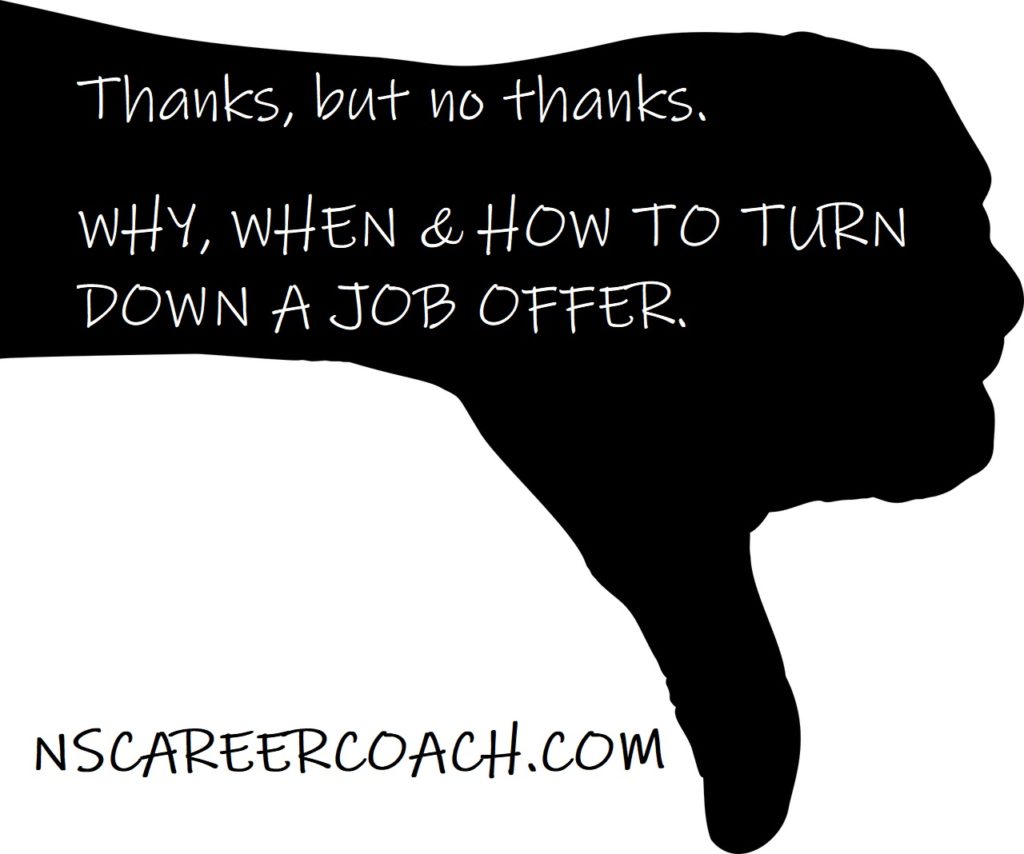
Why
The most important thing you need to ask yourself, why should (would) I decline a job offer? You have been presented with a better, more suitable opportunity (kudos, this is a great problem to have). The location and commute present a burden, one you can imagine will take its toll over time. As you learned more about the job and the company throughout the process, you realize it isn’t what you had anticipated.
Red flags about the company, the boss, and/or the team have presented. The salary and benefits do not align with your needs, expectations, and value. If salary is the only factor holding you back from accepting the position, consider a counteroffer before strictly declining – there is almost always room for negotiation (see tips for salary negotiation in my last blog post). Finally, be sure to trust your gut when feeling hesitant about accepting the role and trust that better opportunities will present.
When
It is critical to make this decision and be prompt in your response (this is true whether you accept or decline). In being timely, you safeguard your reputation, prevent further inconvenience to the organization, and avoid burning a bridge with an employer who may consider you for future opportunities more suitable to your skill set and overall value.
How
A brief phone call or email is acceptable to decline. I recommend a phone call in some circumstances, such as you received a referral for the position, wish to be considered for future opportunities with this employer, or have a relationship with the interviewer. A phone call creates an opportunity for dialogue and leaves a positive impression.
Initiate your communication to decline with gratitude for their time, consideration, and the offer. Be specific and clear about your reason for declining, but keep it brief and try not to overshare. An example, if you are declining for salary reasons, simply state that you must decline based on salary; however, if future circumstances should change, you would be delighted to reconsider – leaving the door open.
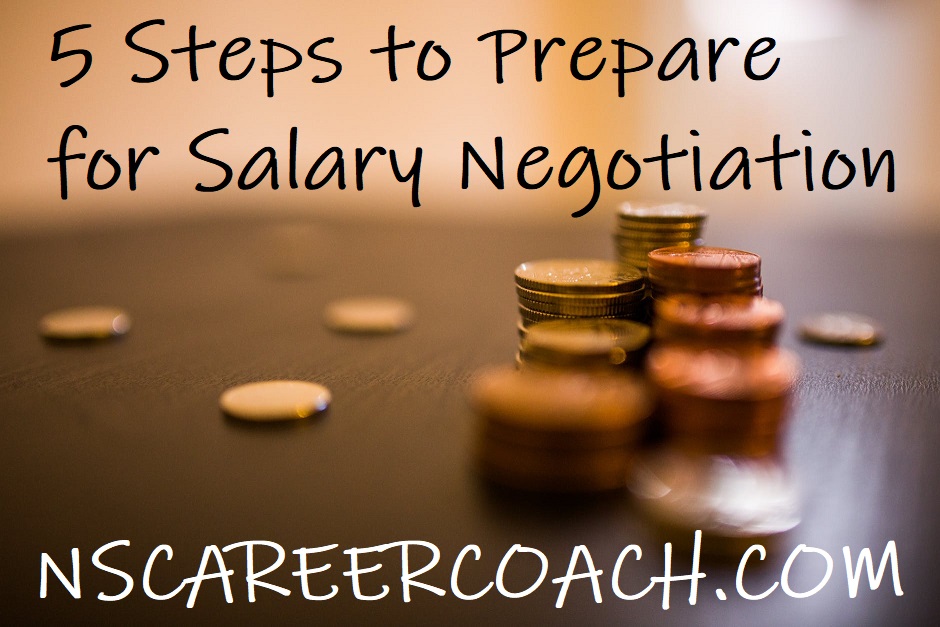
Similar to a game of chess, you will succeed in salary negotiation by being strategic, patient, and thoughtful. Here are 5 steps for successful negotiations.
Do your research
Prior to applying for a position, you should seek to understand the salary range to some degree and determine if applying is in your best interest. Salaries can vary greatly depending upon the industry, the role, your experience level, and location. Labor market tools and websites such as Glassdoor and Indeed can often provide salary data.
Wait for the appropriate time
It is best to wait to discuss salary as opposed to leading your conversations with this complex and sensitive subject. Being patient throughout this process allows you to demonstrate your value leading up to salary talks. Avoid responding to early requests for salary expectations by using statements such as I am sure we can reach a mutually beneficial agreement on compensation. If unavoidable, offer a range that is commensurate with your research and competitive with your current and/or recent compensation.
Consider all of the variables
Remember, salary is one piece of the pie. Take into consideration other variables such as benefits, culture, flexibility, paid time off, and opportunity for growth. Prior to accepting a position, you should request the employee benefit brochure or to speak with a Human Resource representative about employee benefits.
Be flexible and prepare to compromise
The negotiation process is a discussed aimed at reaching an agreement between yourself and your potential employer. It is important to illustrate your willingness to meet in the middle. Prepare in advance and be willing to make concessions throughout the process.
Be prepared to walk away
Determine in advance your worth and be prepared to graciously decline an offer that does not reflect your value nor support what the research says in terms of a fair salary for the position, industry, and geography.
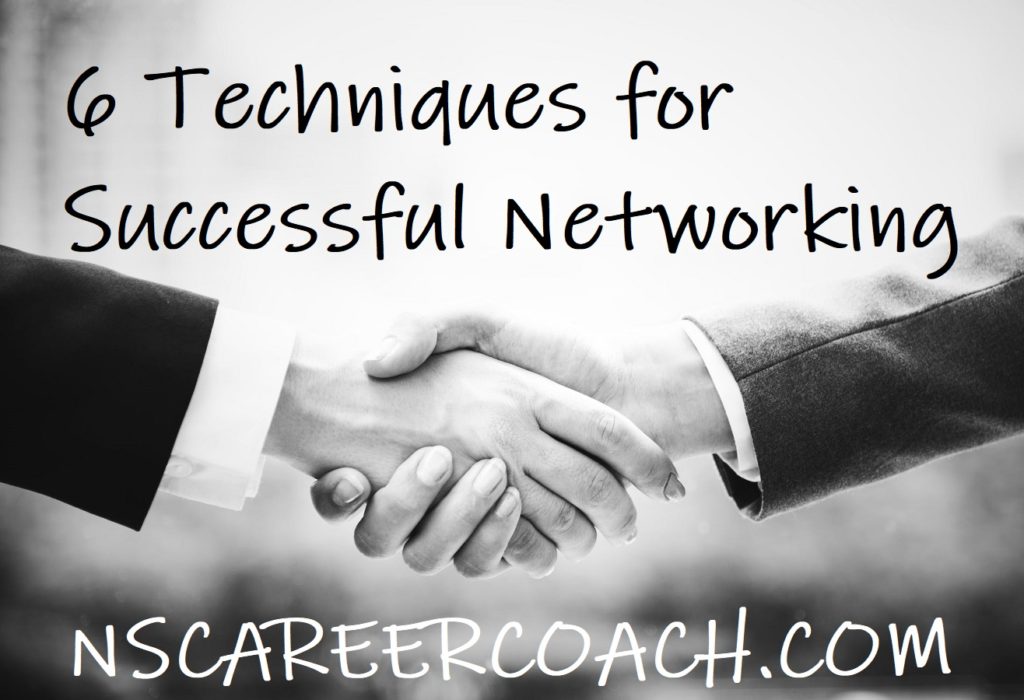
In last week’s blog, “10 Tools for a Highly Effective Job Search,” I focused on networking as one of the most important elements. While networking is an excellent tool for job searching, it should be a regular activity even when you are not actively seeking employment in order to continue establishing new relationships, receiving and sharing advice, and increasing your confidence – all integral to the advancement of your career. Here are six techniques that are critical to be a networking guru.
Identify relevant opportunities
Search your local area for networking events to attend. Websites like Eventbrite will often have postings about free networking events. LinkedIn is another great place to find events and take part in networking by finding colleagues and re-engaging with your current professional network. Talk with colleagues, friends and family members who may be able to connect you with individuals and/or opportunities for networking. Other suggestions: look into young professionals networks in your area, attend professional conferences and engage in alumni events sponsored by the school(s) you graduated from.
Prepare your elevator pitch
Your elevator pitch should be a brief introduction that allows you to succinctly tell others about yourself. A great elevator pitch contains a snapshot of your background, passion, and goals. With a well-prepared elevator pitch you will substantially increase your comfort level and confidence as you meet new people who can potentially provide meaningful relationships and referrals. Practice your elevator pitch with people who you know and trust so that you can receive feedback and become more comfortable.
Express interest & ask questions
Prepare questions in advance to ease the process of meeting new people, striking up conversation and learning about particular professions, industries and companies from those that you meet. Make it a priority to learn about the people with whom you are networking; people genuinely enjoy being asked questions and will be pleased to respond with valuable information and advice. The purpose of networking is not to ask for a job, rather your focus should be on building strategic relationships that provide mutual benefit such as the exchange of advice, support and referrals.
Be a storyteller
A great networker is a great storyteller. You want to be engaging and entertaining as you learn about others and share information about yourself. Think in advance about relevant stories that capture the essence of your experience, personality and passion. Keep your stories brief, relevant to your background and goals, and focus on sharing anecdotes that demonstrate what makes you not only a great person to establish a relationship with, but an excellent candidate.
Gauge interest
In other words, do your best to read your audience. Pay attention to the body language of the individual(s) you’re speaking with in order to determine their interest in the conversation and when it is time to move on and continuing meeting others. Networking events provide limited time to meet and engage in meaningful conversations. Be effective and efficient, taking time to meet several people and schedule follow-up meetings to further establish relationships where there is a mutual desire to do so.
Follow-up
Finally, be sure to follow-up with the new connections you’ve made in order to take full advantage of what networking has to offer you. This can be done over email, by phone, or in-person. Find your new connections and invite them to connect with you on LinkedIn. For those in particular who you wish to learn more from, request an informational meeting with them over coffee or lunch to further establish a relationship. Remember to express your gratitude and pay it forward.

Networking
Networking is arguably the best tool when performing a job search. Effective networking will drastically extend your reach beyond the stereotypical online job application. As you network you will likely become aware of opportunities that otherwise would not be on your radar. You will make critical connections with other professionals who often have great advice to offer, employer and career insights to share, and valuable feedback regarding your background. Networking at its best will lead you to employee referrals, substantially increasing your chance of landing interviews. Find local events in your area on LinkedIn, Eventbrite, news outlets and organizations that promote professional gatherings.
Informational Interviews
An informational interview is a meeting that allows you, the job hunter, to seek career advice and learn about a particular occupation/industry from a professional in the field. This form of active research provides a multitude of benefits including relevant advice as it pertains to your career goals. The informational interview provides a hands-on opportunity to learn from a professional in the role and/or with the company that you intend to pursue. An effective informational interview will create a valuable connection, provide you with unique feedback regarding your candidacy, and expand your knowledge of opportunities.
Research
While not the most appealing or fun part of a job search, research is a necessity to elevate your knowledge and understanding of your goal industry, occupation, and company to work for. While job boards are a tool (to be discussed later in this blog in more detail), not all companies choose to utilize job boards to post their open positions. Researching career opportunities and companies in your region is critical to obtain a broad understanding of what opportunities are available and where. As you decide which companies and roles you are going to target, go the extra mile to learn more about the company by visiting their website, social media, and Glassdoor to read firsthand reviews.
Labor Market Information
Arduous, I know, but another important and often overlooked part of the job search process is gathering Labor Market Information. If you are a young professional, planning to switch industries or occupations, or you are moving to a different geographical area, labor market information is going to be especially vital in your job search efforts. Labor market information will provide you with the data to best understand the demand for employees in particular industries and occupations within your area or the region you plan to relocate to. Labor market information will also provide you with critical information such as the average salary for particular occupations as well as analogous job titles that will lend to a broader and deeper search.
Your Portfolio
Your portfolio will vary greatly depending on your goals and experience. In general, your portfolio is a professional demonstration of yourself including a resume or curriculum vitae, a cover letter, references and/or letters of recommendation, and demonstration(s) of your work. A professional portfolio provides an exceptional first impression and a superior opportunity for personal branding. Keep your portfolio relevant and specific for the position your are seeking.
Keywords
Ever feel like your resume and application enters a black hole the moment you click submit? Resumes and online applications are being scanned by applicant tracking systems more than ever. Tracking systems are often looking for a 90-100% match of keywords so it is imperative that the words in your resume align with the words utilized in the job description. Applicant Tracking Systems will often reject an applicant if every single field in the online application has not been completed. Commit the time necessary to tailor your resume and complete every field within the online job application to substantially increase the chance that your application makes it past the electronic review.
Attitude
Experiencing job search fatigue and burnout is all-too-common. When your job search becomes a burden, it is time to walk away, give yourself a break and re-energize. It is important to keep a pulse on your mindset – becoming frustrated and desperate can only hurt you. While it can be incredibly disappointing to participate in an endless job search yielding no results, know that rejection is a part of the process and shouldn’t be taken personally. It is paramount to remind yourself to be patient and set the right expectations – hearing back from employers can take days, weeks or even months.
Persistence
Alongside attitude comes the need for persistence. Your job search should feel more like a marathon than a sprint. Stay motivated and avoid burnout by setting goals (I will apply for x number of jobs this week) and keep yourself on a schedule with time set aside for job hunting. Anticipate variables outside of your control and don’t become overly invested in one position that you hope to land, one geographic area you hope to work in, or one employer that you hope to work for.
Job Boards
Job boards should be utilized as a tool to supplement your job search and not be relied on as the sole source of your job search efforts. I recommend utilizing job boards to research open opportunities, companies with a multitude of openings, and learn about various job descriptions. By no means is this an exhaustive list, rather a list of the bigger and more reputable job boards to utilize in your search: Indeed, Snagajob, CareerBuilder, ZipRecruiter, Monster, Glassdoor and LinkedIn.
Search Firms & Recruiters
Coming in last on my list of tools for a highly effective job search is search firms and recruiters. If you have participated in a long and exhaustive search, you are unemployed at present time, or you are seeking a short-term role to keep your resume moving forward then you should consider reaching out to reputable search firms and/or recruiters in your region. Professional recruiters will often have listings that are not posted publicly and they will be uniquely positioned to provide you with feedback regarding your resume, experience, and overall candidacy for particular roles. Keep in mind that recruiters and search firms are contracted to work on behalf of a company seeking to fill a role as opposed to working for you, the job seeker. While recruiters may be able to connect you with a great opportunity, their focus will not be to find you a job.

Kick it off with a summary
Resumes are naturally scanned top-to-bottom, often for less than 30 seconds. It is critical to kick off your resume with a summary or profile that gives the reviewer a quick snapshot of your experience, education and strengths. Objective statements have become ineffective and tell the reader very little about why you are an exceptional candidate. Ideally, your summary (or profile) section should call out the specific qualifications that you meet for the particular role that you are applying for.
Don’t be afraid to brag
Your resume is a showcase of you and provides the opportunity to sell yourself. This is your time to brag and show your future employer all of the reasons they need to hire you. Include your accomplishments by giving specific, concrete examples of how you have consistently met and exceeded expectations throughout your career. The most effective demonstration of your accomplishments will be results-oriented, signifying your ability to impact the organization in a meaningful and tangible way. If you have numbers, use them; here are a few examples: dollars raised, budgets managed, employees overseen, new hires recruited, contracts secured, products sold – you get the idea.
Get social
Do you have an up-to-date and professional social media presence? Include a link to your LinkedIn profile and/or your professional portfolio at the head of your resume alongside your contact information. This provides your reviewer with an additional insight into you, your experience and strengths. It also demonstrates additional initiative on your part to craft a well-thought and professional social media/web presence. LinkedIn is also a great opportunity to showcase your network connections and professional recommendations.
Format, format, format
Formatting is one aspect of your resume that is entirely in your control and it provides an early first impression of you. Utilize a font that is clean, modern and easy on the eyes (gone are the days of strictly using Times New Roman). As a general rule, 10 to 12 font size is acceptable and legible. Use a healthy amount of spacing for easy-reading and to encourage the reviewer to continue on. The margins of your resume should fall between 1/2-1 inch; avoid running into printing issues by ensuring spacious enough margins.
Increase the likelihood that your resume will be read by using bullet points to emphasize your experience as opposed to long paragraphs (in other words, your resume should not read like a novel). Call attention to important information such as job titles and headers with bold and/or underlined font or slight color changes. If you have experience that exceeds five years, utilize two pages to showcase your in-depth knowledge and experience. For those with entry-level experience, try to keep your resume to one page.
Keep it relevant
Finally, be sure that your resume is relevant for the role that you are seeking. Your profile, experience, education, and accomplishments should reflect the keywords the employer called out in their job description. Tailor your strengths and experience to closely reflect those that the employer is seeking in an ideal candidate. If you are making a career change and your current title does not reflect the position you are seeking, it is especially important to tailor your resume to highlight the transferable experience and skills that you bring.
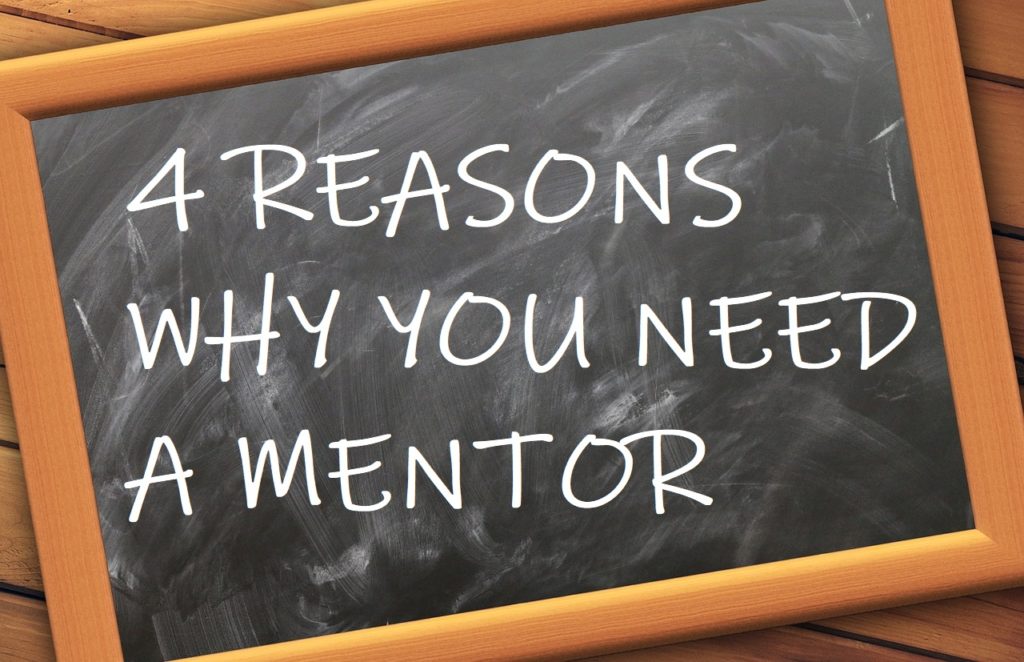
I have been very fortunate over the years and throughout my career to have excellent mentors. I am going to share the four most profound ways that I have been impacted by having a mentor, and why I think you should have one too.
Wisdom & Knowledge
Generally speaking, a mentor will have more experience, and thus a wealth of knowledge and wisdom to share. This source of wisdom is critical to navigate career obstacles, conflicts, and growth. While your mentor is not there to make decisions for you, that individual can provide the support and guidance you will want and need to make well-informed decisions under difficult circumstances.
Challenge & Feedback
A great mentor challenges you to question yourself, generate new ideas, and pushes you just far enough outside of your comfort zone. Ideally you will have a relationship with your mentor that encourages open, transparent, and (at times) tough feedback. With the right mentor in tow, you will grow in ways you never could have imagined and open the doors that seemed endlessly shut.
Sounding Board
This one is really important. Ever have a really tough day at work? Continually applied for a promotion and just don’t understand why it hasn’t been given to you? Your mentor is a (safe and confidential) sounding board. A great mentor is a good listener and the best source for you to share your frustrations with. Your mentor will likely have experienced similar frustrations throughout their career and be able to offer advice that will help you get through difficult times without compromising your reputation in the workplace.
Motivation
I saved the best for last; motivation from your mentor is pivotal to your long-term success. It is easy to become discouraged if you feel stalled in your career or as though you have hit a dead end. A great mentor will pick you up when you are down, give you the tools to persevere, and help you see that success is a journey and not a single destination.
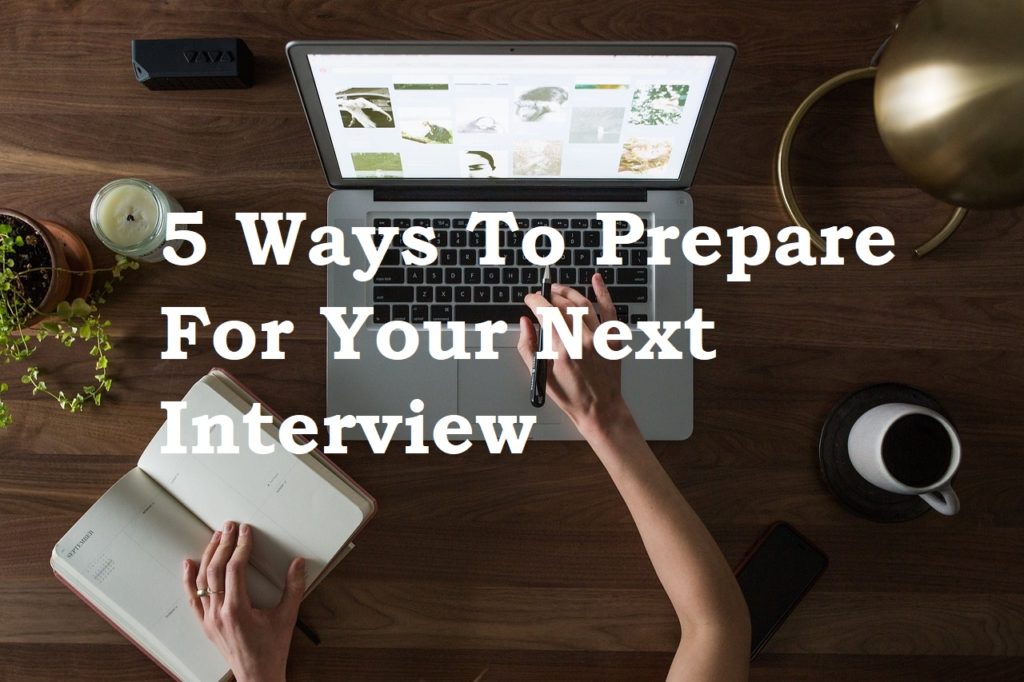
Bring copies of your resume
Bring at least two copies of your resume to the interview. This is a critical step that gives your interviewer a strong first impression of you, demonstrating your ability to be thoughtfully prepared. The second copy is a tool for you to refer to as you speak on your previous experience and qualifications for the role (caution: this does not mean read it like a storybook). Prepare additional copies should you know in advance that you will meet with a panel of interviewers.
Arrive early, but not too early
Arriving early is a great way to establish that pursuing this opportunity is your priority and adds to favorable first impressions. This act demonstrates respect for the interviewers’ time. Arriving late to your interview can have detrimental consequences as your interviewer will make further assumptions about your ability to be reliable. As a general rule, no more than 15 minutes ahead of your scheduled interview time is necessary; being too early can create an awkward circumstance (i.e., counting the ceiling tiles in the waiting area for 30 minutes) and make you appear overzealous.
Research the organization and the role
Researching the organization and the role in advance is vital to demonstrate your knowledge of the company and the specific position you hope to attain. Interviewers will often open the interview by inquiring about your understanding of the organization and the role – you want to feel confident and prepared to respond. The more you know about the organization and the position, the better you will be able to equate your skills and qualifications to their needs.
Prepare questions for the interviewer
At the close of your interview you can expect your interviewer to ask, “What questions do you have for me?” Prepare at least three questions in advance to ask your interviewer about the organization and the position you are interviewing for. This act further demonstrates preparedness and your desire to learn more. Additionally, this is your opportunity to address any outlying information such as the management style of your potential supervisor, the members of the team that you would work with, or the next steps in the application process.
Participate in a mock interview
A mock interview is a simulation of a job interview and is among the best ways to prepare via recreating the experience in a low-pressure environment. This role play activity boosts confidence and the ability to be succinct in your responses. The mock interview process will increase your comfort level when it comes time for the real thing. Interviews are inherently nerve racking; the more practice you have the more proficient you will become.

Prior to experiencing a layoff I had many assumptions about what it would feel like, how I would respond, what I would do next, and who I would turn to… but my first assumption was the most dangerous one: that wouldn’t happen to me. Especially during a time of historically low unemployment. I’m sure you have heard about the unemployment rate, about the workforce shortage, the skills gap, the exodus of youth, and the declining birth rate. This is a different kind of story.
I spent the better part of the last decade building a personal narrative around what I did rather than who I was or, more importantly, who I wanted to be. With any loss comes a natural grieving period. My initial emotional response looking something like this:
- Shame
- Disappointment
- Depression
- Blame
- Embarrassment
- Anger
It wasn’t long before I realized that being caught up in these feelings was getting me nowhere fast. I made a conscious decision to enter in hyper-focus mode, which led to task lists, an aggressive job search, and reaching out to my network – this is when the tide began to change. As I reached out to friends, family, former colleagues, and even those in my second degree of contacts, I was met with an overwhelming show of support. The relationships that I had once allowed to cease in tireless pursuit of my career goals became the turning point and the beginning of an awakening.
This leads me to my first piece of advice: focus on your relationships and those will support you during a time of need. A friend and colleague challenged me to think about the important relationships in my life and who I could count on when it mattered the most. He asked [I’m paraphrasing], should I pass suddenly who would send flowers vs. who would attend my funeral? This became a profound and defining moment. While I struggled with the question at the time, it has since put things into perspective for me and allowed me to let go of the relationships that previously consumed me yet often provided little benefit. My final point on this, it is very easy to allow yourself to become isolated during a time of loss. Challenge yourself to interact and maintain the social connections that matter most.
About one week into being unemployed I attended a family wedding with something like 200 people. I was faced with the all-too-common question when you meet someone new: “What do you do?” This is a difficult question if you’ve just lost your job, which leads to my second piece of advice: identify with something other than your job title. This is arguably the least important thing about you and a boring topic of conversation (unless of course you’re an astronaut). If you’re wondering, I didn’t have a great answer for this at the time.
This leads well into my third piece of advice: find the new, revive the old, and maintain the activities [outside of work] that make you happy. For me this meant rediscovering my love for reading, writing, going for walks, discovering new artists, spending quality time with the family pet [unconditional love is a real thing], focusing on my relationship, and listening to my favorite podcasts. Additional suggestions and a few cliches: watch the sunset, exercise, take a class, or see a comedy show. The bottom line, distract yourself from negativity, screen time, and the pressures of work.
My fourth and final piece of advice: be grateful. Focus on what you have rather than what you wish to have. I will end with a quote from Zig Ziglar, Gratitude is the healthiest of all human emotions. The more you express gratitude for what you have, the more likely you will have even more to express gratitude for.